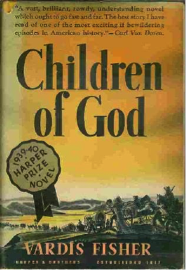 Title: Vardis Fisher: A Mormon Novelist
Title: Vardis Fisher: A Mormon Novelist
Author: Michael Austin
Publisher: University of Illinois Press
Introductions to Mormon Thought series
Genre: Literary/intellectual history
Year Published: 2021
Number of Pages: Paperback: 128
Reviewed by Rachel Helps
This is an excellent book. I wish I had had it when I was re-writing the Vardis Fisher Wikipedia page. The main biography I had then was one written by a journalist, which Austin describes as “very lightly sourced” and that gets details wrong by taking Fisher’s novels as literal autobiography. That was one of the impressions I got of Tiger on the Road too.
Austin has done a simply staggering amount of research. When I read books like this as a researcher, I spend a bit of time staring at notes and references. Austin’s references include a lot of archival sources and hard-to-find newspaper articles. Also, every time I had a question and looked at the notes, my question was answered. Bravo.
Austin’s prose is not without occasional humor, like when he points out that Philemon’s defense of religion despite the character’s atheism in The Island of the Innocent is “hopelessly inappropriate.” There are some epiphany-level insights, like when Austin compares the way that Fisher describes his character-types as Orphans in Gethsemane to the religious idea of being defined by the absence of belief, to Fisher’s absence of belief in Mormonism being the driving force behind his large body of work. Some of the Austin’s other arguments about Fisher’s work being driven by latent religious belief weren’t as convincing to me, like how Fisher’s idea that life evolved from kelp because it had an “urge to sink roots” being an unscientific evidence of belief in a “teleological view of evolution.”
 There was another important research finding! Which was that the LDS church did not wage a campaign against Children of God! John A Widtsoe didn’t like Children of God, wrote a three-paragraph critical review of the book for the Improvement Era, but (I think?) never published it. However, he did send this copies of this critical review to the first presidency and the technical producer of the film Brigham Young (1940), among others. The official LDS position on the book was silence.
There was another important research finding! Which was that the LDS church did not wage a campaign against Children of God! John A Widtsoe didn’t like Children of God, wrote a three-paragraph critical review of the book for the Improvement Era, but (I think?) never published it. However, he did send this copies of this critical review to the first presidency and the technical producer of the film Brigham Young (1940), among others. The official LDS position on the book was silence.
If you are starting a research project on Vardis Fisher, or if you only read one book on Vardis Fisher, make it this one! You may not get the sensational story of Fisher running around naked on his farm to get into character for his book about proto-humans, but you will get a well-researched and reliable summary of Fisher’s life and work.
(Please see Michael Austin’s earlier post on early Mormon literature and canon building, including a discussion of Fisher’s novel April)
